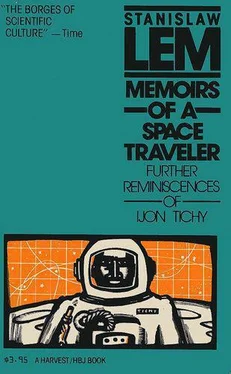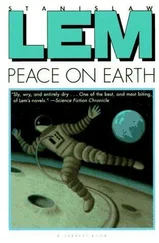The Machine parted its metal lips and invited me in.
“What do you take me for, a Phool?” I replied.
I turned sharply and headed for the rocket, and in a minute was behind the controls, taking off at top speed.
FURTHER REMINISCENCES OF IJON TICHY
You want me to tell you another story? Yes, I see that Tarantoga has already taken out his note pad… Professor, wait. I really haven’t anything to tell. What? No, truthfully. And besides, can’t I remain silent for once at our evening get-together? Why? My friends, I’ve never mentioned it, but the Universe is inhabited principally by beings like us. I don’t mean humanoids, I mean beings as like us as two peas in a pod. Half the inhabited planets resemble Earth; some are a little larger, some a little smaller, some have a cooler or a warmer climate, but what kind of differences are those? And their inhabitants… the people — they are people, after all — resemble us so much that the differences only emphasize the similarities. I haven’t told you about them? Does that seem strange? Think about it. When I gaze at the stars, I recall various events; various scenes pass before me. But mainly I think back on those that are out of the ordinary. They might be terrifying, or weird, or macabre, or even funny, by virtue of being harmless. But to gaze at the stars, my friends, and to know that those small, bluish-white sparks are — when you set foot on them — kingdoms of squalor, ignorance, and all manner of ruin; that the dark-blue sky up there is also full of old shacks, dirty yards, gutters, garbage dumps, overgrown cemeteries… Should the stories of one who has toured the Galaxy sound like the complaint of a peddler who knocks about provincial towns? Who would want to listen? And who would believe it? Such thoughts come to you when you’re depressed or feel an unhealthy urge to tell the truth. So, then — in order not to sadden or mortify you — nothing about the stars today. I’ll tell you a story — otherwise you’d feel cheated — but it won’t be a journey. After all, I’ve had a few experiences on Earth as well. Professor, if you must, you can start taking notes.
As you know, I have guests — sometimes very strange guests. In particular, a certain category: the Unappreciated Inventor and Scientist. I don’t know why, but I’ve always attracted that type like a magnet. Tarantoga’s smiling, but I don’t mean him; he’s hardly an unappreciated inventor. Today I shall talk about those who were unsuccessful — or, rather, about those who succeeded too well, who reached their goal and saw its futility. Of course, they didn’t admit this. Unknown and isolated, they persisted in their folly, which only fame and success may — however rarely — change into a work of progress. The great majority of those who came to see me belonged to the gray brotherhood of obsession, people imprisoned within a single idea, an idea not even their own but appropriated from previous generations; people like the inventors of the perpetuum mobile; weak in imagination, and trivial and absurd in their solutions. Yet even they burn with that consuming fire of objectivity that forces a man to renew efforts that are doomed to failure. How pitiful are these flawed geniuses, these titans of stunted spirit, crippled at birth by nature, who, as one of her grim jokes, bestowed upon their talentlessness a creative frenzy worthy of a Leonardo. Their lot in life is indifference or mockery, and all that you can do for them is listen patiently for an hour or two and nod at their monomania.
In this group, who are protected from despair only by their stupidity, one occasionally runs across a different breed — I don’t want to label it, you’ll do that yourselves. The first who comes to mind is Professor Corcoran.
I met him nine years ago, maybe ten. It was at a scientific conference. We had been talking for only a few minutes when, out of the blue (it had nothing to do with the topic at hand), he asked me:
“Do you believe in ghosts?”
At first I thought this was a joke, but I recalled hearing rumors about his singularity — only I couldn’t remember whether that singularity was supposed to be a positive or a negative thing. To be on the safe side, I answered:
“I have no opinion on that subject.”
He returned to our conversation as if nothing had happened. But when the bell announcing the next session of the conference rang, he suddenly leaned over — he was much taller than I — and said:
“Tichy, you’re my man. You have an open mind. I may be wrong, but I’m willing to take a chance. Come see me.” And he handed me his card. “Call first: I don’t open the door to anyone. But it’s up to you…”
That same evening, while I was dining with Savinelli, the well-known specialist in cosmic law, I asked him whether he knew a Professor Corcoran.
“Corcoran!” he shouted with his characteristic enthusiasm, an enthusiasm fueled by a second bottle of Sicilian wine. “The screwball cyberneticist? What’s he up to? I haven’t heard from him in ages.”
I replied that I knew nothing myself, but had merely heard the name in passing. My evasion, I believe, would have suited Corcoran. Savinelli told me some of the current gossip as we drank wine. Corcoran, presumably, had been a very promising young scientist, though even then he showed utter disrespect for his elders, if not arrogance. Later he became insufferably outspoken, the sort of person who derives satisfaction not only from telling others what he thinks of them, but also from the fact that in so doing he damages himself. Having mortally offended his professors and colleagues, and when all doors had closed before him, he unexpectedly came into a large inheritance. He bought a run-down place outside of town and remade it into a laboratory. He lived there with his robots — they were the only assistants he could tolerate. He may have accomplished something there, but the pages of the scientific journals were barred to him. That didn’t bother Corcoran. If he still had any dealings with people at that time, it was only to rebuff them, in the most insulting manner and for no apparent reason, after they had reached a certain intimacy with him. When he grew old and tired of that disgusting game, he became a recluse. I asked Savinelli whether he knew anything about Corcoran’s belief in ghosts,. The lawyer, drinking wine just then, nearly choked with laughter.
“In ghosts?” he cried. “Why, the man doesn’t even believe in people!”
I asked him what he meant. He replied that he meant it quite literally: Corcoran was a solipsist. He believed only in his own existence and regarded all other people as phantoms, apparitions. Perhaps that was why he treated even his family and friends so shabbily: if life was a sort of dream, then anything was permitted. I remarked that in that case he could believe in ghosts as well. Savinelli asked if I had ever heard of a cyberneticist who believed in ghosts. We then talked about something else, but what I had heard was enough to intrigue me. I’m a man who makes up his mind quickly, so I called Corcoran the very next day. A robot answered. I gave my name and stated my business. Corcoran did not call back until late the following evening, when I was just about to turn in. He said I could come see him then and there if I wished. It was almost eleven. I said I’d be there at once, got dressed, and took off. The laboratory was a large, gloomy building set just off the highway. I had often seen it. I had thought it was an old factory. It was enveloped in darkness. Not the faintest light could be seen in any of its deep-set rectangular windows. The large square between the iron fence and the gate was also unlit. A few times I walked noisily into some rusty pile of metal scraps, so I was in something of a foul mood by the time I reached the barely visible door and rang in the special way Corcoran had instructed me. After five minutes or more he opened it himself, wearing a gray lab coat covered with acid burns. He was alarmingly thin and bony, with huge glasses and a gray mustache that was shorter on one side, as though he had gnawed on it.
Читать дальше












